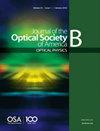用主金属引申法预测薄膜合金折射率
IF 1.9
4区 物理与天体物理
Q3 OPTICS
Journal of The Optical Society of America B-optical Physics
Pub Date : 2023-09-29
DOI:10.1364/josab.497825
引用次数: 0
摘要
由于沉积条件对纳米结构材料性能的影响,薄金属合金的折射率变化可达100倍以上。为了在特定沉积条件下更准确地估计薄膜合金的RI,通过扩展合金的主要元素特性,导出了未经测试的合金的RI模型。其中一个关键的推导是通过四个假设将RI多项式方程简化为单项式表达式。因此,比值法可以根据主金属的性质准确预测相同沉积条件下薄膜合金的RI。该模型适用于薄膜合金MX的红-红外光谱,其中M是铜、银或金中的一种,X是总浓度为10%的一种或多种元素。本文章由计算机程序翻译,如有差异,请以英文原文为准。
Predicting Refractive Index of Thin-Film Alloys by Extension from the Main Metal
Due to dependence of nanostructural material properties on the deposition conditions, the refractive index (RI) of a thin-metal alloy can vary by over 100×. For a more accurate RI estimation of thin-film alloys under a specific deposition condition, a model of RI for untested alloys is derived by extension from the alloy’s main element properties. One of the key derivations is to simplify RI polynomial equations into monomial expressions through four assumptions. Thus, a ratio method can accurately predict the RI of thin-film alloys from the properties of their main metals under the same deposition condition. The model is valid in the red to infrared spectrum for thin-film alloys MX where M is one of copper, silver, or gold and X is one or more elements with total concentration <10%.
求助全文
通过发布文献求助,成功后即可免费获取论文全文。
去求助
来源期刊
CiteScore
4.00
自引率
5.30%
发文量
374
审稿时长
2.1 months
期刊介绍:
The Journal of the Optical Society of America B (JOSA B) is a general optics research journal that complements JOSA A. It emphasizes scientific research on the fundamentals of the interaction of light with matter such as quantum optics, nonlinear optics, and laser physics. Topics include:
Advanced Instrumentation and Measurements
Fiber Optics and Fiber Lasers
Lasers and Other Light Sources from THz to XUV
Light-Induced Phenomena
Nonlinear and High Field Optics
Optical Materials
Optics Modes and Structured Light
Optomechanics
Metamaterials
Nanomaterials
Photonics and Semiconductor Optics
Physical Optics
Plasmonics
Quantum Optics and Entanglement
Quantum Key Distribution
Spectroscopy and Atomic or Molecular Optics
Superresolution and Advanced Imaging
Surface Optics
Ultrafast Optical Phenomena
Wave Guiding and Optical Confinement
JOSA B considers original research articles, feature issue contributions, invited reviews and tutorials, and comments on published articles.

 求助内容:
求助内容: 应助结果提醒方式:
应助结果提醒方式:


